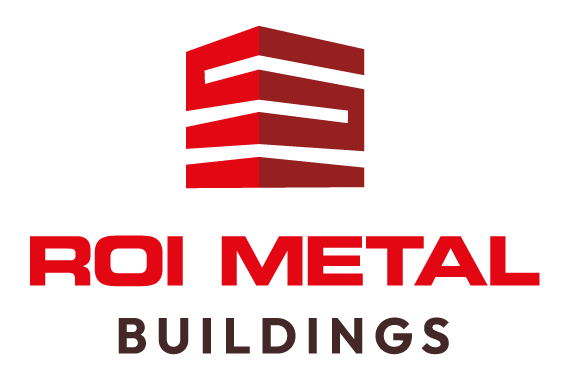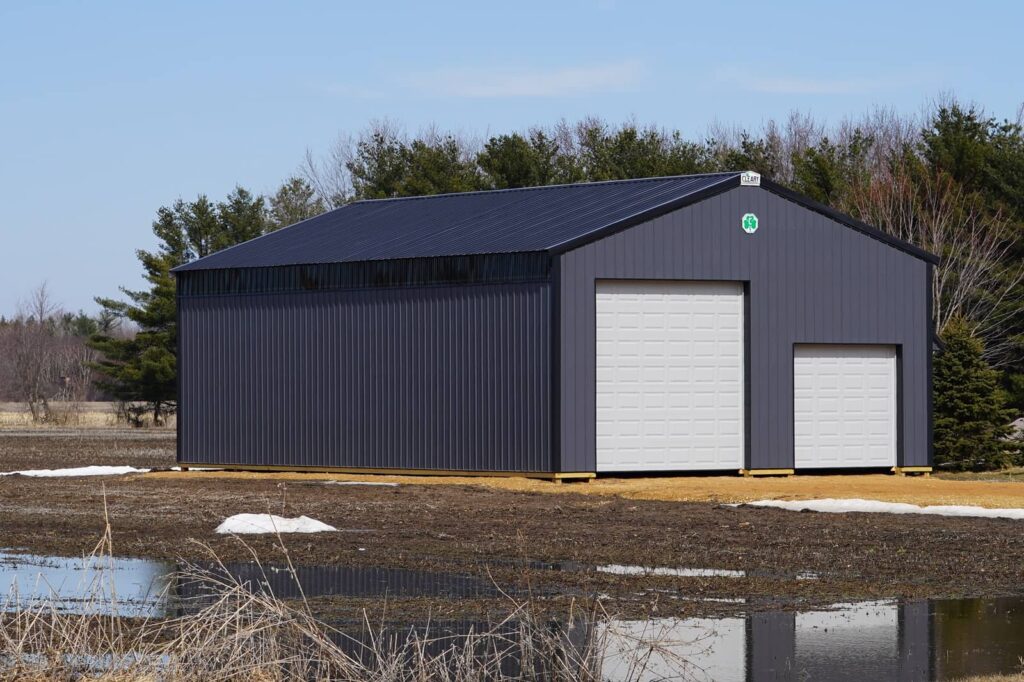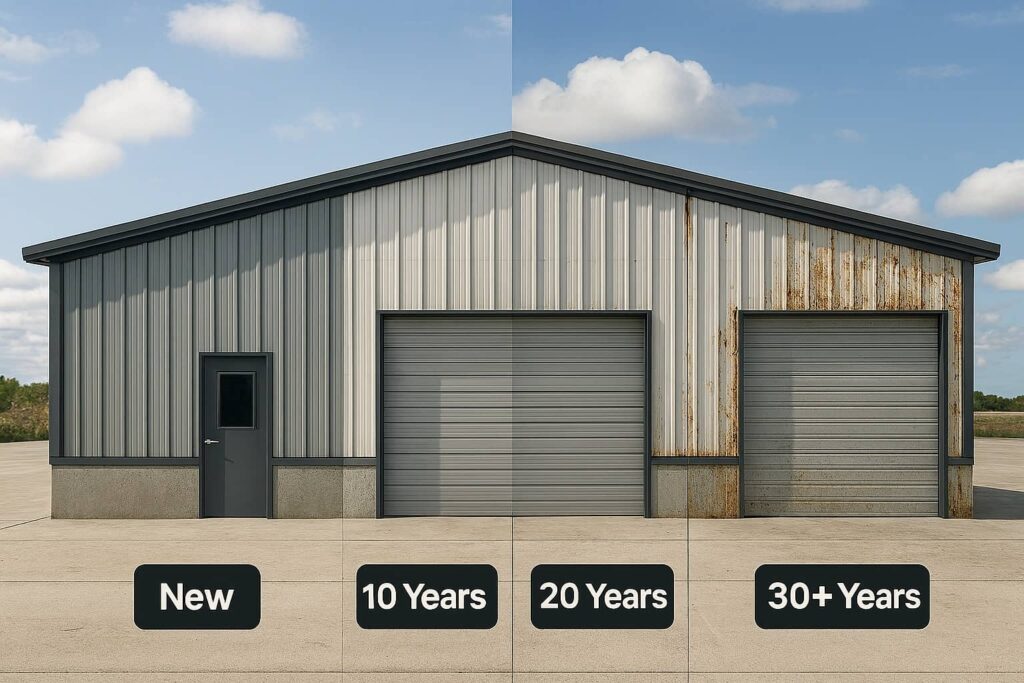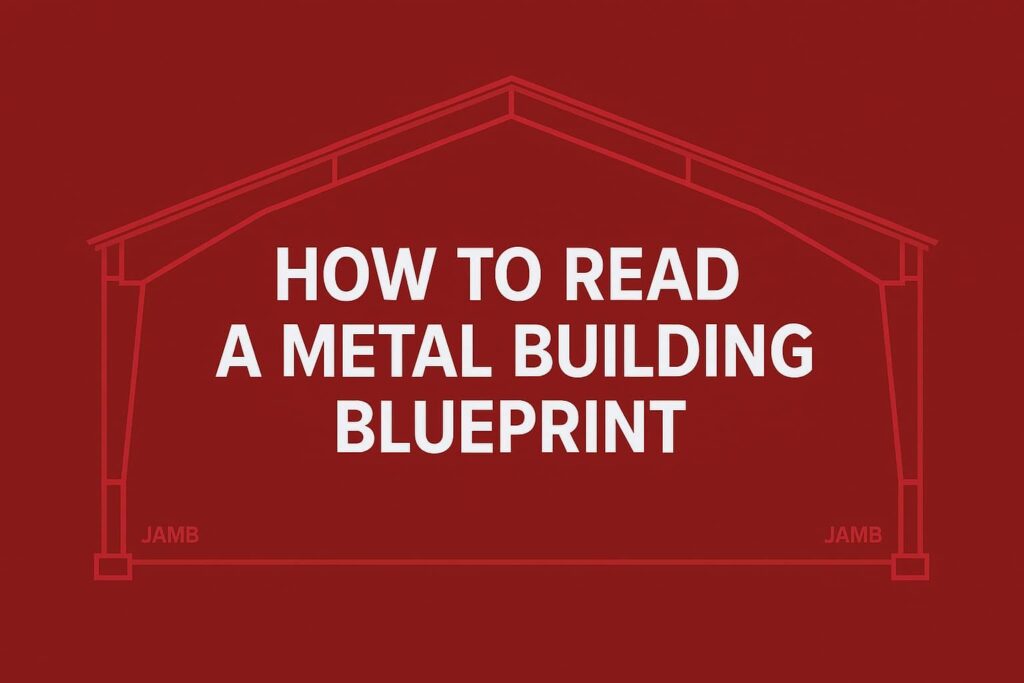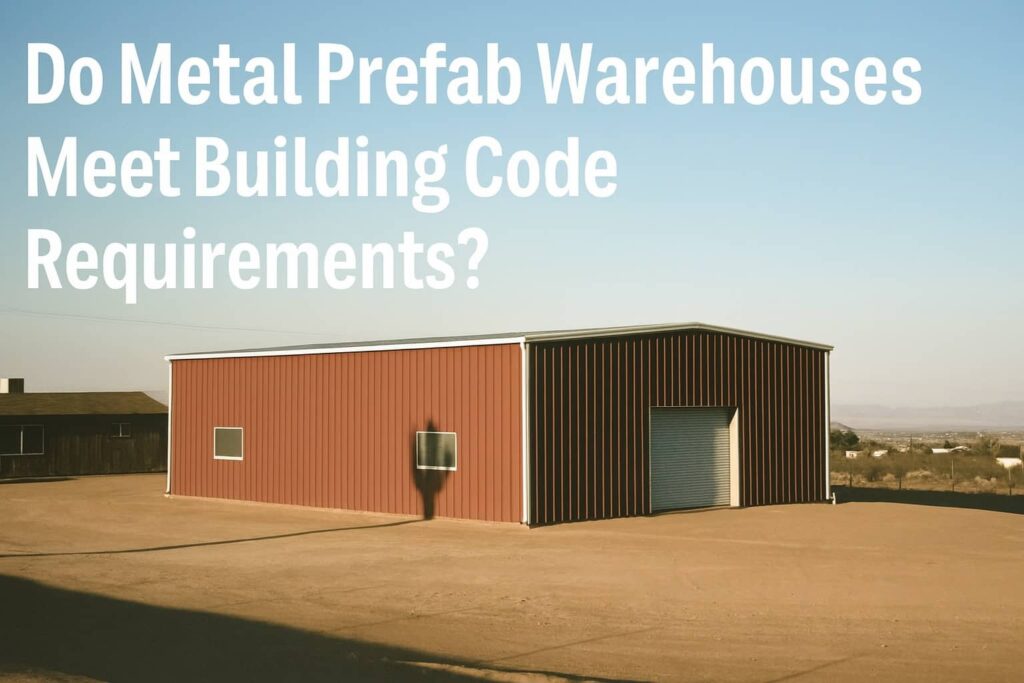Deciding between a metal and wood garage often balances on weighing long-term benefits against upfront costs. Picture yourself evaluating not just immediate expenses but also considering routine upkeep and what the future holds for each type of structure. Diving into this decision can seem daunting at first; however, understanding the pros and cons of metal vs wood garages is crucial – let’s get started.
Imagine facing unpredictable weather—think snowfalls weighing down roofs or relentless rain soaking wooden beams—and knowing your choice in building materials could eliminate these worries. Your decision boils down to examining both durability and cost efficiency side-by-side, which reveals more than just surface-level advantages but incorporates sustained value over time.
This article is the first of a series dedicated to commercial and residential metal garage buildings. Earlier this week, we wrote an article about the benefits of metal garage buildings. Stay tuned over the coming weeks as we dive deep into the world of garages. If you’ve followed our articles in the past, you’re familiar with the insights and tips shared within. If you plan on adding a garage to your property, look no further than ROI Metal Buildings for all the crucial information to get started!
Metal garages offer greater durability, lower construction costs, and easier installation compared to wood garages. Conversely, wood garages may have a more aesthetically pleasing appearance but require higher maintenance due to susceptibility to pests, rot, and mold. Ultimately, the choice between metal and wood garages depends on individual needs, budget, and climate.
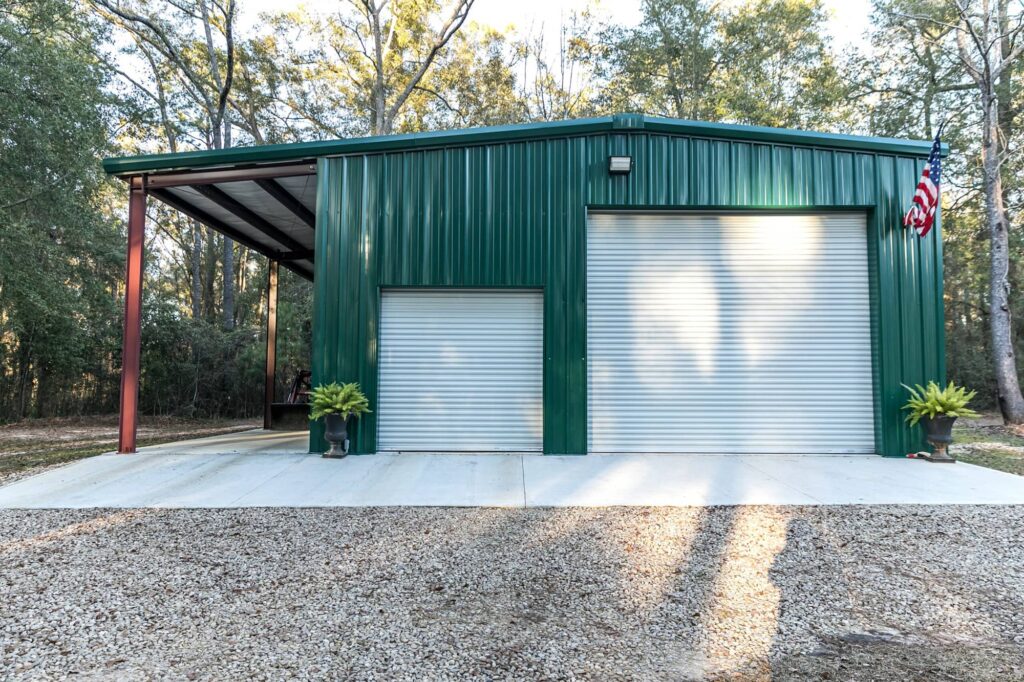
How Much Does it Cost to Build a Metal Garage?
Cost is a significant factor when constructing a garage. Metal garages generally have a lower initial cost when compared to wood garages. The average price for a metal garage is approximately $5 per square foot, while wood garages can range from $7 to $10 per square foot. While this initial cost difference might not appear significant initially, it can add up when dealing with a larger structure.
It’s crucial to consider the long-term financial benefits as well. Metal garages have lower maintenance costs compared to wood garages. While wood structures may demand more frequent repairs due to pest control and rot, metal structures are renowned for their durability and require fewer repairs over time, resulting in long-term savings for metal garage owners.
For example, over ten years, the maintenance costs for a metal garage typically range from $500 to $1,000, while wood garage maintenance costs can be significantly higher at $2,000 to $4,000. Additionally, the resale value of metal garages after ten years tends to be higher—around 60% to 70% of the initial cost—compared to wood garages, which typically retain only 50% to 60% of their initial investment.
Furthermore, financing options play a crucial role in deciding between metal and wood garages. For those concerned about the initial cost of a metal garage, many building brokers, including ROI Metal Buildings, offer flexible financing options to help offset these initial costs, making it much easier for property owners to invest in a durable and long-lasting metal garage without bearing the full financial burden upfront.
While metal garages may have a lower initial cost, they also offer significant long-term savings and financing options that make them attractive for those seeking a durable and cost-effective solution for their storage or property needs.
Now let’s turn our attention to exploring another vital aspect—Weather Resistance and Insulation.
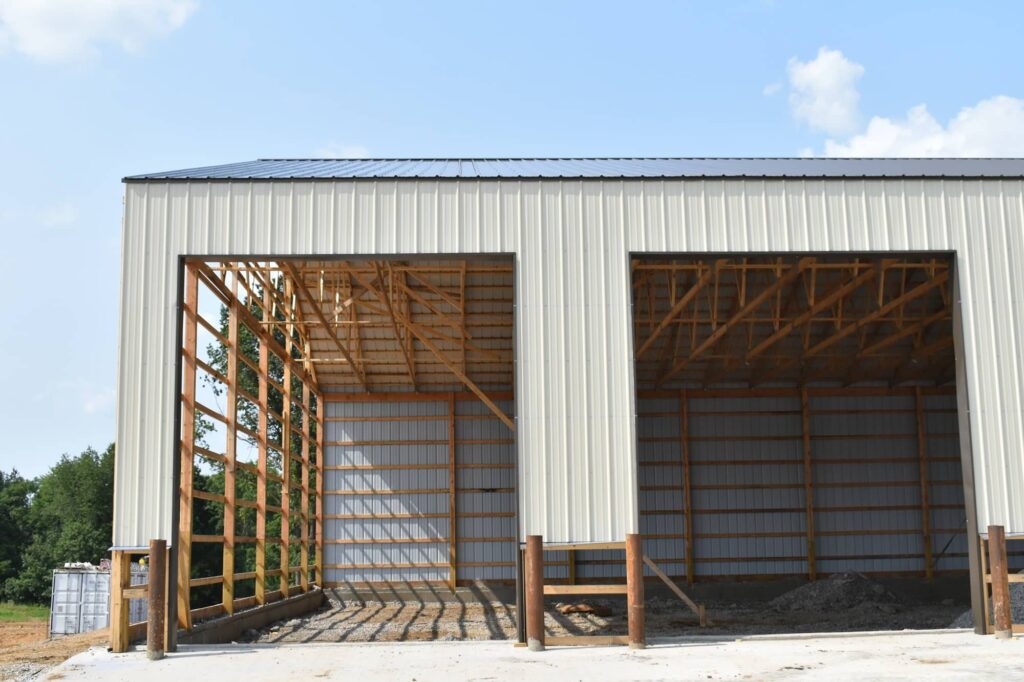
Weather Resistance and Insulation
When it comes to withstanding the elements, metal garages take the prize for durability against harsh weather. Heavy rain, snowfall, or strong winds are no match for a well-constructed metal garage. Unlike wood structures, which can warp, swell, or even rot when subjected to prolonged moisture, metal stands strong, maintaining its shape and integrity.
Metal garages are built to resist the elements. They stand firm without succumbing to the effects of inclement weather. This attribute is especially valuable in regions prone to heavy rainfall or snow, where constant exposure to moisture can significantly affect a garage’s longevity.
Insulating Your Garage
Now, let’s talk about keeping your garage comfortable all year round. While wood naturally possesses insulating properties to regulate indoor temperatures, advancements in construction techniques have enabled metal garages to achieve comparable or even superior insulation levels using foam or fiberglass insulation.
Additionally, specialized weatherproofing methods can mitigate metal’s susceptibility to temperature variations inside the garage. These techniques ensure that your metal garage maintains stable internal temperatures, reducing condensation issues commonly associated with fluctuations in atmospheric conditions.
Imagine having a well-insulated metal garage that keeps you warm during chilly winters and comfortably cool during scorching summers. With proper insulation and weatherproofing, the difference in comfort levels between wood and metal garages narrows significantly.
Considering the impact of weather resistance and insulation on your choice of garage material is vital for making an informed decision. Next, we’ll focus on diving deeper into durability and pest resistance in metal and wood garages.
Durability and Pest Resistance
Metal garages boast impressive durability, often surpassing 100 years without succumbing to the wear and tear that can plague wooden structures. The inherent strength of metal resists warping, cracking, and damage caused by external forces, such as heavy winds or impact. This longevity offers a significant advantage over wood, as metal structures are known for providing a reliable storage solution for decades to come.
Consider the impact of everyday wear and tear – metal garages handle it with ease, maintaining their structural integrity and appearance through the years. When you invest in a metal garage, you’re investing in a long-term storage solution that bypasses the common issues of aging and degradation associated with wood.
Pest Resistance: Metal vs Wood Garages
One of the most compelling advantages of metal garages is their natural pest resistance. Termites, carpenter ants, and other destructive pests that commonly target wooden structures pose little to no threat to metal constructions. This unparalleled resilience against invasive insects alleviates the need for regular pest control treatments, saving both time and money while ensuring the continued integrity of the structure.
In contrast, wooden garages demand vigilant pest control strategies to stave off infestations and mitigate potential damage. The susceptibility of wood to pest infiltration underscores the necessity of ongoing maintenance and intervention to preserve its structural stability. Imagine the peace of mind that comes with knowing your garage is impervious to destructive pests, alleviating the worry of potential damage and costly treatments associated with wooden structures.
In summary, the exceptional durability and pest resistance offered by metal garages solidify their status as a long-term storage solution that transcends many challenges faced by traditional wooden structures. Metal garages indicate a clear advantage over their wooden counterparts in terms of resilience, offering peace of mind and enduring quality to those seeking reliable storage solutions.
Security Features
When it comes to safeguarding your belongings stored in a garage, security becomes a top priority. Metal garages have an edge over wood ones in terms of structural security. The robust construction of metal garages makes them less susceptible to forced entry compared to their wooden counterparts. Thieves would find it far more challenging to breach metal panels without specialized tools. This considerable resistance to unauthorized access provides added peace of mind for those storing valuable items in their garage.
Additionally, metal garages are known for their superior fire resistance compared to wood. Metal is non-combustible, making it a safer choice for protecting stored assets within the garage. In the unfortunate event of a fire, items stored within a metal garage have a better chance of being preserved due to the fire-resistant nature of the building material.
This enhanced security feature is especially valuable if the garage will be utilized for storing vehicles, power tools, or other expensive equipment. These valuable items are better protected in a secure environment provided by a metal garage, reducing the risk of theft or damage from unauthorized access.
Consider a scenario where a homeowner stores valuable vintage cars in their garage. The added security provided by a metal garage can significantly reduce the risk of theft or vandalism, offering peace of mind knowing that their prized possessions are well-protected within their secure structure.
By considering these security aspects, it becomes evident that metal garages offer notable advantages over wood garages in terms of both structural integrity and fire resistance, underscoring the importance of thoughtful consideration when choosing the best option to meet your storage needs.
As we evaluate the security features of garages, it’s imperative to dive deeper into the aesthetic considerations that may influence your decision.
Aesthetic Considerations
When choosing between a metal and wood garage, the aesthetic appeal significantly influences decision-making. The visual impact of your garage extends beyond personal preference; it contributes significantly to your property’s overall curb appeal.
Customization Options: While wood garages offer a traditional and classic look, metal garages can be customized with various colors, finishes, and designs to suit personal preferences. This customization flexibility allows you to tailor your metal garage to complement your existing property aesthetics or express your personality through unique designs.
Curb Appeal: Many people find wood aesthetically pleasing with its natural look. However, modern metal garages can be designed to imitate wood textures or other materials, offering a versatile appearance that enhances curb appeal. The ability to emulate the traditional aesthetics of wood while providing the durability and structural integrity of metal is an attractive option for homeowners seeking a balance between visual appeal and practicality.
Suppose you live in an area with strict architectural guidelines or historical preservation requirements that favor traditional building materials like wood. In that case, metal garages designed to mimic the appearance of wooden structures can help maintain compliance while offering the added benefits of durability and cost-effectiveness.
Additionally, modern advancements in metal garage construction have expanded design possibilities, allowing for sleek, contemporary looks that complement various architectural styles. The ability to customize metal garages with a wide range of colors, finishes, and architectural details provides homeowners with the versatility needed to blend seamlessly into their property’s aesthetic vision.
Beyond just appearances, it’s essential to consider how well your chosen garage material harmonizes with the overall aesthetic of your home. The right choice can enhance your property’s visual appeal, while an unsuitable one may detract from its charm.
Considering these aesthetic aspects helps you understand how both metal and wood garages can beautifully integrate with your property’s style and ambiance.
Installation Time and Complexity
When it comes to getting your new garage set up, one of the most important factors to consider is the time and effort needed for installation. Metal and wood garages differ significantly in this regard, with metal options often being more efficient in terms of both speed and complexity.
Speed of Installation
Prefab metal garages offer a significant advantage in installation speed. They can be assembled on-site in less than a day, providing a remarkably quick solution. This rapid installation is particularly beneficial for those who are in need of immediate storage or shelter solutions, allowing them to have a functional garage in no time. On the other hand, wood garages typically require a longer construction period, involving more labor and time.
It’s not just about the tangible structure itself; it’s about the ease and convenience that come with swift project completion. In situations where time is of the essence, perhaps due to impending weather conditions or urgent storage needs, the quick assembly of metal garages can make all the difference.
Complexity
The complexity of installation is another crucial consideration. Metal garages are generally easier to construct, requiring fewer specialized skills. This reduction in required expertise not only contributes to faster installation but also minimizes the potential for errors during the process. Conversely, wood constructions may necessitate more intricate carpentry skills, permits, and inspections.
While some individuals possess the required carpentry skills for wood garage construction, others may find it daunting or impractical to take on such a project. The reduced complexity of metal garage installation opens up the possibility for a wider range of individuals to successfully undertake this task without facing overwhelming challenges. This inclusivity speaks to the accessibility and ease associated with metal garage installations.
To put it simply, metal garage installation is like assembling a jigsaw puzzle with large, well-defined pieces that fit together easily, while wood garage installation involves more like piecing together a complex model kit with many intricate parts that demand precision and expertise.
In summary, when considering the speed of installation and complexity, prefab metal garages have a clear advantage over wood garages. The swift assembly and reduced complexity associated with metal constructions offer tangible benefits by providing efficient solutions that cater to diverse needs.
As we continue our exploration of essential considerations for garage ownership, let’s now turn our attention to another vital aspect: maintenance requirements.
Maintenance Requirements
When it comes to maintaining your garage, there are important differences between metal and wood structures. Let’s explore these differences in detail to help you make an informed decision.
Metal garages are known for being low-maintenance, requiring only occasional checks for rust and periodic rinsing to remove debris. This simplicity in maintenance gives metal garages an edge, especially for individuals who value convenience and practicality.
On the other hand, wood garages have more demanding maintenance needs. They require regular painting to protect the wood from weather damage and maintain its appearance. Sealing the wood is also essential to protect it from moisture, which can lead to rot and deterioration over time. In addition, wood garages are more susceptible to pest infestations, so addressing this potential problem is another crucial part of their maintenance requirements.
Consider the annual maintenance cost comparison – on average, it costs about five times more to maintain a wood garage compared to a metal one. This significant difference in maintenance expenses should not be overlooked when deciding between the two options.
Understanding the maintenance requirements for each type of garage is essential in making an informed decision. By considering the long-term implications of maintenance efforts and costs, you can ensure that your chosen garage aligns with your preferences and resources.
What are the main advantages of choosing a metal garage over a wood garage?
The main advantages of choosing a metal garage over a wood garage are durability and longevity. Metal garages are resistant to rot, pests, and weather damage, making them more reliable in the long run. Additionally, they require less maintenance compared to wood garages. According to a survey conducted by GarageBuilders.com, 80% of homeowners who chose metal garages reported being satisfied with their decision due to the enhanced durability and low maintenance needs.
In terms of maintenance and upkeep, which type of garage requires less effort: metal or wood?
Metal garages generally require less maintenance and upkeep compared to wood garages. Metal is known for its durability, resistance to rot, pests, and weather. With metal garages, there is no need for painting or staining, unlike wood garages which often require regular maintenance to prevent decay or mold. According to a study conducted by the National Association of Home Builders, metal garages have a longer lifespan and lower overall maintenance costs compared to wood garages.
Are there any factors that should be considered when deciding between a metal or wood garage in terms of climate or location?
Yes, there are several factors to consider when deciding between a metal or wood garage in terms of climate or location. In areas with extreme weather conditions such as frequent storms or high humidity, wood garages may be more prone to rotting, warping, or insect damage. On the other hand, metal garages are generally more resistant to these issues but can be susceptible to rust in coastal regions with high salt content in the air. Additionally, metal garages tend to fare better in areas with heavy snowfall due to their strength and durability.
What is the average lifespan of a metal garage compared to a wood garage?
The average lifespan of a metal garage is generally longer compared to a wood garage. Metal garages can typically last for 20-30 years or more, while wood garages may have a lifespan of around 15-20 years. This is because metal is more durable and resistant to the elements, such as rot, termite infestations, and fire damage, which are common issues with wood structures. Additionally, metal garages require less maintenance and are less susceptible to warping, cracking, or fading due to weather conditions. While individual factors may vary, these general trends support the longevity of metal garages over wood ones.
Are there any specific disadvantages to having a metal garage compared to a wood garage?
Yes, there are specific disadvantages to having a metal garage compared to a wood garage. One major drawback of metal garages is that they are prone to rust and corrosion over time, especially in areas with high humidity or proximity to saltwater. Additionally, metal garages can be more susceptible to dents and scratches, which can affect their overall appearance. On the other hand, wood garages have a traditional and aesthetically pleasing look, can be customized easily, and often have better insulation properties than metal garages, leading to energy efficiency.
Want To Talk About Metal vs Wood Garage Buildings?
If you’re ready to take the next step in selecting the perfect garage for your needs, feel free to contact us for personalized assistance and expert advice. Give us a call at 865-316-9009. Also, if you like our content and want to stay current, follow us on Facebook!
